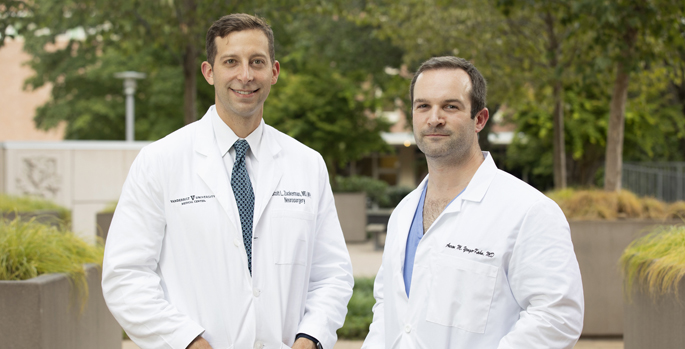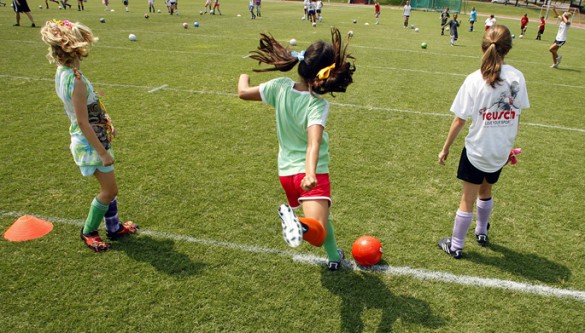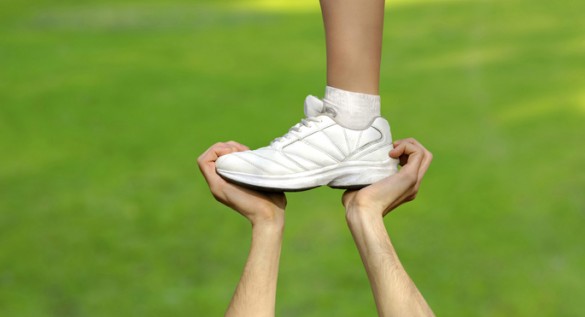
A study comparing sports-related concussion recovery in young Black and white athletes found that Black athletes reported faster resolution of their symptoms and earlier return to school than their white counterparts.
The study, “Exploring the outcomes and experiences of Black and White athletes following a sports-related concussion (SRC): a retrospective cohort study,” was a collaboration between Vanderbilt University Medical Center’s Sports Concussion Center and the University of Alabama, Tuscaloosa. It appeared recently in the Journal of Neurosurgery: Pediatrics.
Approximately 38 million children and adolescents participate in organized sports annually, and as many as 20% of these young athletes report a previous SRC, according to a 2019 national study. Black athletes make up 16% of collegiate athletes across all three NCAA divisions.
The idea for the study came about during early conversations between Vanderbilt investigators and Jessica Wallace, PhD, MPH, from the University of Alabama, Tuscaloosa, who was working with the center on a Southeastern Conference Collaboration Grant.
“Jessica had done a significant amount of work in the space of racial disparities in concussion education and knowledge, but had not yet had enough data to really analyze recovery in younger athletes. In 2020, mid pandemic, it dawned on us, independently, that hardly anyone was looking at race in concussion studies, so it was fortuitous that Jessica reached out to us to collaborate at that time,” said Aaron Yengo-Kahn, MD, a VUMC neurosurgery resident, co-director of Research at the Vanderbilt Sports Concussion Center and the paper’s first author.
“If you look at the literature, there are very few sport-related concussion studies on outcomes that even considered the possibility of race as a social determinant of health or even a relevant co-variate. It didn’t make sense, because if you look at the youth athlete population, it’s extremely diverse.
“There are randomized controlled trials for concussion that don’t even report the race of the athletes involved,” Yengo-Kahn said. “How can we generalize and apply these studies if we don’t even know who participated in them?”
The authors used the Vanderbilt Sports Concussion registry to look at 211 white and 36 Black athletes, ages 12-23 who were treated for a sports related concussion between 2012 and 2015. The pilot study population included middle school, high school and collegiate student athletes in mostly Middle Tennessee, but also northern Alabama and southern Kentucky.
The findings suggest a relationship between race and symptom duration, school days missed and changes to post-concussion activity. Black athletes experienced a shorter duration of symptoms (12 days compared to 21 days among white athletes) and returned to school more quickly.
These results are a starting point for future research looking at race differences in SRC, Yengo-Kahn said.
“Based on Jessica’s prior work on attitudes and concussion knowledge across races, it may be that the Black athletes appear to be recovering faster, but because they are simply reporting fewer symptoms and reporting earlier resolution to get back to playing sports or to what they were doing prior to the concussion,” he said. “Using a more recent dataset, we have found a significant discrepancy in symptom reporting between Black and white athletes, which also supports this hypothesis.”
The findings also have great implications for future research on SRC, he said. “If you know these groups of athletes are so different in their recovery, you need to start accounting for that when you’re studying them, otherwise prior findings in heterogenous groups of athletes may not be equally applicable,” Yengo-Kahn said.
“Even after controlling for many confounding variables, we were still able to see differences, which we were frankly not expecting to see,” said senior author Scott Zuckerman, MD, MPH, assistant professor of Neurological Surgery.
Zuckerman said it’s not clear why there’s such a discrepancy about symptom reporting in the two groups. “Our study wasn’t designed to assess causality. That said, there could be many cultural and individual reasons for these racial differences that we hope to elucidate in further studies.”
Another study by the same group, “Healthcare Navigation of Black and White Adolescents Following Sport-Related Concussion: A Path Towards Achieving Health Equity,” appeared recently online in the Journal of Athletic Training. It looked at 582 adolescent athletes seen at the Vanderbilt Sports Concussion Clinic.
“The results showed that Black and white athletes presented to the clinic at about the same time and through the same pathways, so ultimately we narrowed the possibilities down to initial reported symptom burdens driving the difference in recovery times,” Yengo-Kahn said.
The authors note that an SRC center assimilation and affiliation with school systems may be helpful in improving access and providing equitable care across diverse patient demographics.
Yengo-Kahn said another multi-institution retrospective study, which is currently undergoing peer review, looked at the symptom scale (a 22-symptom checklist) that athletes complete and rate each symptom with a severity of 0-6.
“The thought was that maybe the symptom scale isn’t measuring the same thing across both groups, preventing comparison. Maybe Black athletes are rating everything consistently lower than white athletes,” he said. But the analysis showed the scale is comparable across both groups.
Yengo-Kahn said the next step, as Vanderbilt’s SRC center grows, is to determine the prevalence of SRC out in the community where the student athletes are being seen, and whether there are racial disparities in diagnosis and referral for treatment at a broader level than in the athletes seen at Vanderbilt.
“We know that having a full-time athletic trainer is helpful in diagnosing and properly managing concussion, but a lot of lower resourced areas and schools may not have a full-time trainer or a trainer at all,” Yengo-Kahn said. “This is a very important subfield of concussion research. I think we’re at the very tip of the iceberg.”
Also participating in the Journal of Neurosurgery: Pediatrics study from VUMC were Viviana Jimenez, MD, MPH, Douglas Totten, MD, MBA, and Christopher Bonfield, MD.















